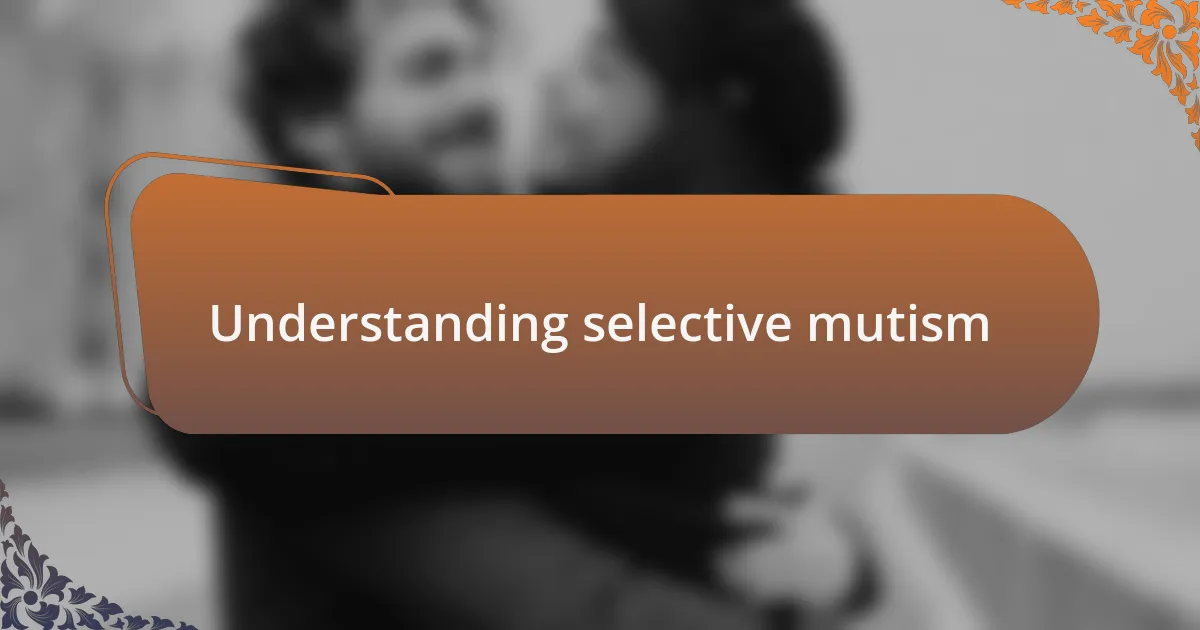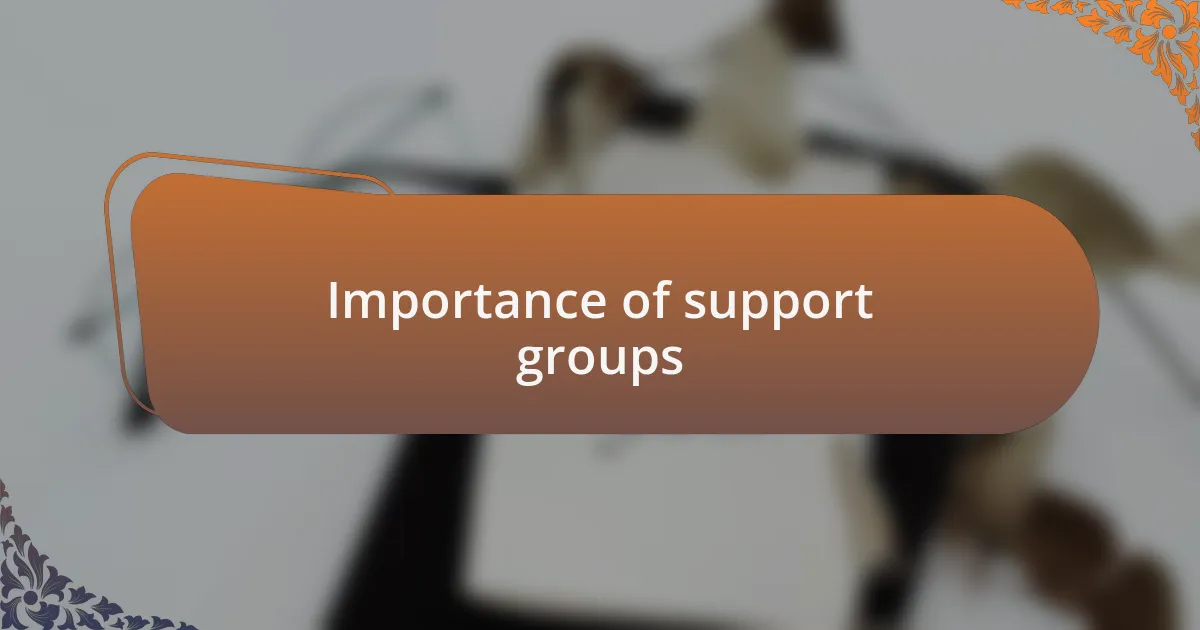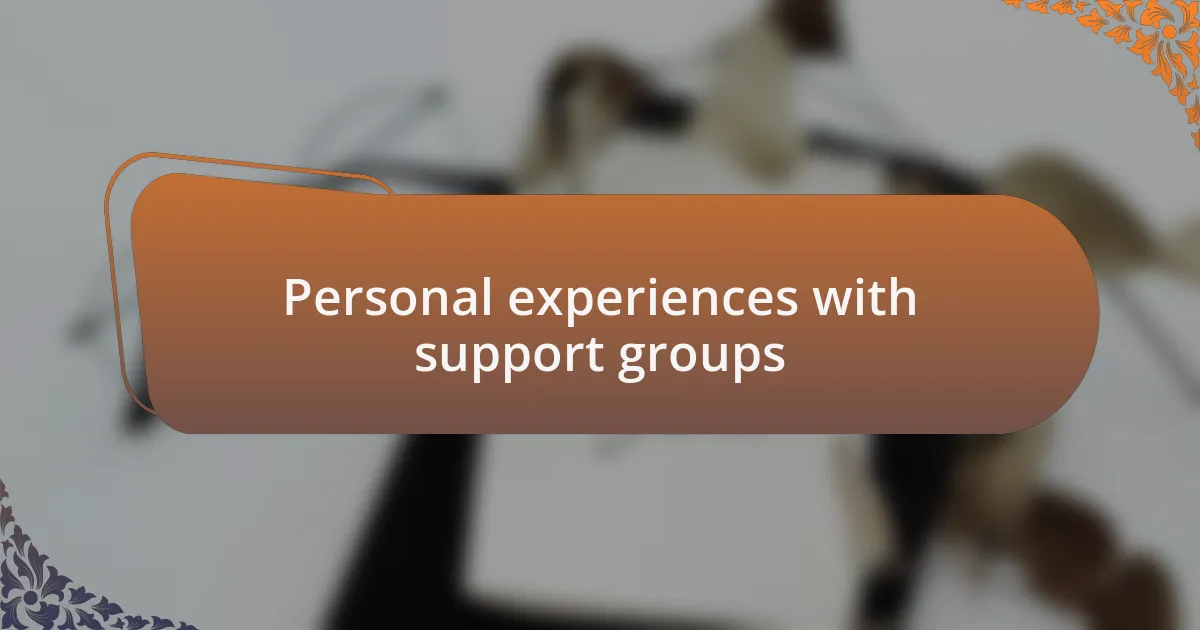Key takeaways:
- Selective mutism is an anxiety disorder characterized by an inability to speak in certain social situations, often rooted in fear and extreme shyness.
- Support groups provide emotional support and practical strategies, fostering a sense of belonging and encouraging personal growth through shared experiences.
- Participation in support groups helps individuals feel validated and connected, allowing for the exchange of coping mechanisms and inspiring collective progress.
- Personal stories shared within support groups create a ripple effect, encouraging vulnerability and deeper emotional connections among members.

Understanding selective mutism
Selective mutism is more than just a reluctance to speak; it’s a complex anxiety disorder that primarily affects children, often stemming from extreme shyness or fear in social situations. I often reflect on how I felt as a child, standing silently in groups where speaking seemed impossible. It’s heartbreaking to witness someone struggle to find their voice, isn’t it?
Understanding selective mutism means recognizing that it’s not a choice to remain silent but rather an overwhelming fear that grips those affected. When I was a kid, I remember being in a classroom where sharing my thoughts felt like standing on a cliff’s edge. What would happen if I spoke? Would I be judged? Such thoughts can be paralyzing and often lead to feelings of isolation.
This condition can be frustrating for both the individual and their loved ones. I’ve seen parents who desperately want to help their kids open up but feel helpless when their child simply cannot express themselves. How do you support someone whose silence speaks volumes? Understanding the emotional landscape of selective mutism can empower friends and family to offer the support needed without adding pressure to speak.

Importance of support groups
Support groups play a crucial role in providing a safe haven for individuals experiencing selective mutism. I recall attending my first group session, where the shared stories resonated deeply with me, helping to normalize my feelings of anxiety. Isn’t it comforting to know you’re not the only one grappling with silence?
The collective strength found in support groups often fosters a sense of belonging that those with selective mutism desperately need. I remember watching people slowly open up; their progress inspired me to take small steps in my own journey. How powerful it is when we realize we’re all here, facing similar challenges together!
Additionally, support groups offer practical strategies and coping mechanisms that can make social situations less daunting. I once learned a technique from a fellow member that transformed how I approached speaking in public, making it a little less intimidating. What if we could equip each other with these tools for growth? With guidance from those who truly understand, we can navigate the complexities of selective mutism more effectively.

Benefits of support groups
Support groups offer a unique opportunity for individuals to share their experiences and challenges in a non-judgmental environment. I remember once hearing someone describe their “silent struggles” in such a vivid way that it made my own feelings feel valid. Have you ever had a moment like that, where someone’s words reflect your own buried thoughts? It’s moments of connection like these that reinforce the importance of community.
Another significant benefit of support groups is the emotional support they provide. I often found that just being in the presence of others facing similar difficulties was incredibly uplifting. There’s an unspoken solidarity that often turns into a source of comfort and hope. Isn’t it amazing how sharing our fears can lighten the load?
Practical advice exchanged in these settings can lead to meaningful growth. I’ve participated in discussions where members would share tips that paved the way for breakthroughs in their own lives. For instance, one friend introduced me to role-playing as a way to practice speaking in low-pressure situations. How transformative could it be to apply such tactics in our everyday lives? In a support group, we can explore these ideas together, learning from each other’s successes and setbacks.

Personal experiences with support groups
While attending a support group meeting for the first time, I felt a mix of anxiety and anticipation. It was fascinating to observe the range of emotions on everyone’s faces. I still remember the person beside me seeing my nervousness and reaching out with a warm smile, making me realize we were all in the same boat. Have you ever felt a wave of relief just knowing you’re not alone in your struggles?
One evening, a member shared their experience of overcoming a speaking challenge at a friendly gathering. Listening to their story inspired me to reflect on my own journey and the small victories I’ve experienced. It struck me how sharing personal stories creates this powerful ripple effect: when one voice rises, it encourages others to share too. Could it be that vulnerability is what truly binds us together in these moments?
Gradually, I started to notice the emotional depth of these gatherings. Just being surrounded by individuals who intimately understood the complexities of selective mutism was like being wrapped in a familiar blanket. I realized that sometimes, all we need is that safe space where expressing fears or anxieties feels accepted. How far have you come in your journey by simply having someone listen? These moments are catalysts for healing and growth that I cherish deeply.